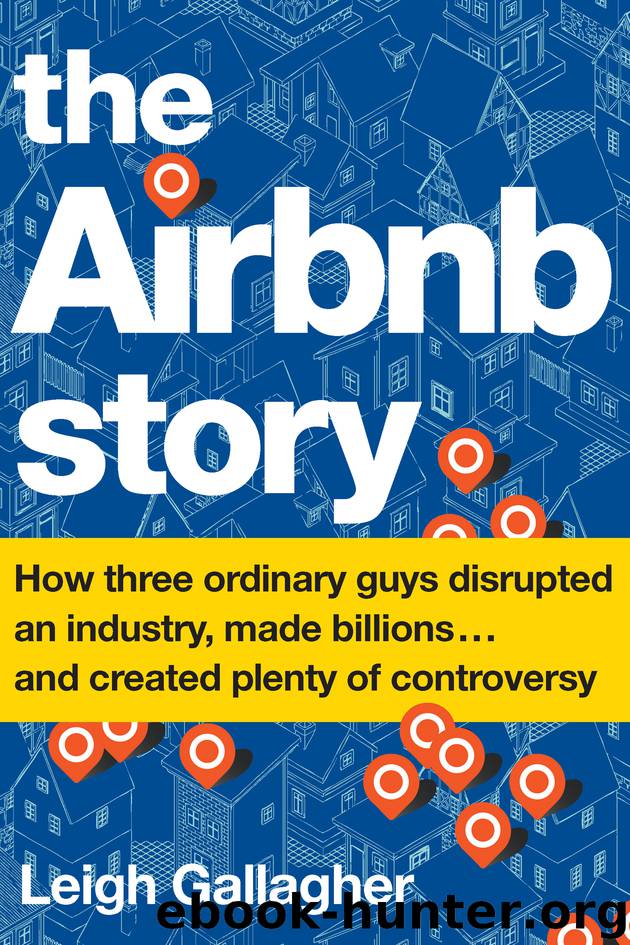The Airbnb Story by Leigh Gallagher

Author:Leigh Gallagher
Language: eng
Format: epub
Publisher: Houghton Mifflin Harcourt
The He-Said, She-Said of Home Sharing
Airbnb’s response has always been that it doesn’t want corporate profiteers, and that over the years it has worked to eliminate them. It stepped up those efforts in the fall of 2015 when it introduced a new “community compact,” a pledge to work more closely with city officials and, in particular, to help curb any impact of its business on affordable housing. It released a report filled with data on its operations in New York City, and said it was moving to a “one host, one home” policy there. “We strongly oppose large-scale speculators who turn dozens of apartments into illegal hotel rooms,” the report read. “Illegal hotels are not in the interests of our guests, our hosts, our company, or the cities where Airbnb hosts share their space.” The most recent report on Airbnb’s New York operations showed that 95 percent of its hosts in the city had only one listing, and the median nights booked per listing is forty-one per year.
The issue with critics, however, has been not the percentage of hosts but the volume of the business that comes from commercial interests, whether individual hosts controlling multiple units or even one unit that is dedicated solely to rental on Airbnb. Different studies over the years have shown commercial listings to represent as much as 30 percent of inventory and, depending on the definition, up to 40 percent of revenue or more in some markets. In the summer of 2016, Share Better put out a study of Airbnb’s New York activity that identified 8,058 listings it called “impact listings,” offered by hosts who had more than one unit rented out for at least three months per year, or a single unit rented for at least six months per year. It said those units reduced the availability of rental housing by 10 percent.
Airbnb has always maintained that the data offered by outside parties is inaccurate. Its most recent data in New York at this writing showed that multiple-listing activity represented 15 percent of its active entire-home inventory in the city and 13 percent of overall host revenue, down from 20 percent of revenue a few months earlier. Its critics say that data doesn’t tell the full story; they want the company to release anonymized data showing the location and rental behavior of its individual hosts, which the company refuses to do, to protect its customers’ privacy.
Chesky says that a lot of nuances about Airbnb’s workings are lost in the headlines. “We really do care deeply about this issue, and we are trying to solve it,” he says. He insists that large real estate groups are not what the company wants. “We don’t have much differentiation if it’s a corporate rental,” he says. “It feels like a hotel. There’s less belonging.”
Purging commercial operators, the company says, is not so simple. Some of the multilisting activity is activity that is legal: units that are rented for more than thirty days, or listings of homes with fewer
Download
This site does not store any files on its server. We only index and link to content provided by other sites. Please contact the content providers to delete copyright contents if any and email us, we'll remove relevant links or contents immediately.
| Biographies | Company Profiles |
| Economic History |
Pale Blue Dot by Carl Sagan(3997)
The Rules Do Not Apply by Ariel Levy(3899)
Goodbye Paradise(2951)
Delivering Happiness by Tony Hsieh(2919)
Liar's Poker by Michael Lewis(2806)
Into Thin Air by Jon Krakauer(2695)
Purple Cow by Seth Godin(2695)
Ogilvy on Advertising by David Ogilvy(2678)
Rogue Trader by Leeson Nick(2469)
The Airbnb Story by Leigh Gallagher(2364)
The Social Psychology of Inequality by Unknown(2305)
The Mind Map Book by Tony Buzan(2075)
Six Billion Shoppers by Porter Erisman(1996)
Bossypants by Tina Fey(1984)
Claridge's: The Cookbook by Nail Martyn & Erickson Meredith(1959)
All the President's Men by Carl Bernstein & Bob Woodward(1957)
Master of the Game by Sidney Sheldon(1877)
Alibaba by Duncan Clark(1752)
Wild Ride by Adam Lashinsky(1655)
